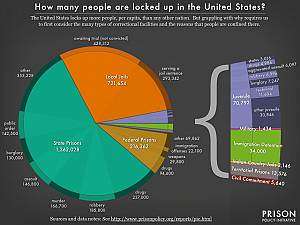5 Issues (Among Many) on Which Libertarians Are On Your Side
Are libertarians just Ayn Rand-obsessed pot smokers who want to hide their money from the tax man? That's what many critics of the libertarian movement, and its seemingly looming moment in American history (as reported by the New York Times) would have you believe. But maybe we're smoking that grass because we're all too aware of what government officials do with that money (and to us all) when they get their hands on it (Ayn Rand did provide some cautionary tales, if you care to read her books).
Below are just five of the many issues on which libertarian journalists, independent think-tankers, state-challenging politicians, and freedom-loving litigators, among others, have worked to preserve and extend our liberty over the years. These are issues that matter to us. We think they should matter to you too—and they already may.
America's Insane Incarceration Rate

"Every ten or eleven people that you meet, someone is going to either know someone in prison, has been in prison with a record, or you met them and they are going off to prison," Michael Stoll, co-author of Why Are So Many Americans in Prison?, told Reason last year.
Those who now fill the nation's jails, prisons, and detention centers, says the Prison Policy Initiative, number about 2.4 million people.
The United States actually has the second highest incarceration rate in the world, just behind the Seychelles, says the International Centre for Prison Studies. That's an accomplishment, of sorts. Just not the good kind.
After years of escalating efforts against crime, the Land of the Free has made itself not so very free—and much of its population not free at all.
Speaking at a meeting of the National Urban League last month, libertarian-leaning Sen. Rand Paul (R-Ky.) noted that "Three out of four people in prison right now for non-violent crimes are black or brown. Our prisons are bursting with young men of color and our communities are full of broken families."
Paul joined with Sen. Cory Booker (D-NJ) to sponsor the REDEEM (Record Expungement Designed to Enhance Employment) Act. The proposed legislation would seal and expunge juvenile records and create a path for non-violent adult offenders to seal their criminal records so they can have a fresh start at making lives for themselves. The law would also give states incentives to increase the age of criminal responsibility to 18, so that young offenders are spared the harshest penalties.
Many individuals and organizations, such as the Cato Institute's Tim Lynch and Families Against Mandatory Minimums, would go further, reducing penalties for numerous crimes and eliminating often-cruel mandatory sentencing laws that allow little leeway for individual circumstances.
The Insane War on Drugs
The easiest way to get thrown behind bars in recent years has been by using, buying, selling, or merely possessing an intoxicant that doesn't meet politicians' approval. Prohibition of alcohol may have failed, but the impulse to prohibit—and to penalize those who don't or won't get with the program, continues in laws against marijuana, cocaine, methamphetamine, and myriad other substances.
Reason has covered that war from the beginning—notably, in the documentary America's Longest War, which provides a brief history of drug prohibition, beginning with Nixon's declaration of war in 1971 and ending with Obama's broken promise to allow states to determine their own medical marijuana policies. The documentary also puts a human face on the war, examining some of the individuals victimized by officials' insistence on telling people what they can and can't put into their bodies.
Reason recently focused on marijuana prohibition with a special issue and online "Marijuana on Main Street" compilation of stories, videos, and other features. Marijuana arrests have served as a first bust for many Americans, introducing them to the police, prisons, and curtailed civil rights.
Libertarians from Milton Friedman to Ron Paul have favored marijuana legalization, and recent years have seen real progress in this arena. Once the focus of reefer madness-style propaganda, states began legalizing marijuana for medical use in the 1990s. Colorado and Washington have both legalized it for recreational use (though the battle isn't over).
Check out where marijuana stands in the 50 states here (though keep in mind that laws are happily evolving).
The Libertarian Party favored full drug legalization as far back as its first platform in 1972.
Whatever the Hell Happened to Police in This Country

You can't have prisons groaning full of people busted for drug violations without somebody to put them there. That somebody is inevitably law enforcement in all its various permutations—though you might be forgiven for thinking it's an occupying army, given the military tactics, equipment, and mindset that so many police departments have adopted.
Former Reason senior editor Radley Balko, now at the Washington Post, penned Rise of the Warrior Cop, a book delving into the militarization of American policing, which built, in many ways, on a paper he wrote for the Cato Institute in 2006.
"The police have become more militarized, more soldier-like in the last generation or two," Balko told Reason after the publication of his book "It applies to the weapons they are using, the uniforms they wear…to the tactics they use, to what I think is the most pervasive problem which is the mindset that police officers take to the job."
Cato's Timothy Lynch continuously monitors police misconduct on a depressingly regular basis. The incidents he reports don't all involve cops in tanks and battledress—many involve corruption, old-fashioned brutality, or general bad behavior.
There is occasional good news, too. New York City's notorious stop-and-frisk program, which overwhelmingly targeted young black and Hispanic men for Fourth Amendment-defying pat-down searches on the street, were declared unconstitutional as implemented in 2013. While not entirely abandoned, city officials have reined-in the practice.
Small Business-Killing Meddling

Government officials don't have to unleash uniformed minions on you to make your life miserable—they can do the same thing with a web of red tape and a plague of inspectors. The challenge of making an honest living can become almost impossible when burdened with bureaucracy.
Karate legend Fumio Demura, who worked as Mr. Miyagi's stunt double in The Karate Kid franchise, has been threatened with the loss of his dojo because politicians in Santa Ana, California, decided to grab his (and other business owners') property for their pet projects. Upstart bus companies are smothered by "safety" regulations that favor established lines at the expense of entrepreneurial outfits.
Washington, D.C. was finally shamed into relaxing its restrictions on food trucks—popular, mobile eateries that provide a relatively low-cost way for would-be restaurateurs to find eager customers without having a huge bankroll to get them launched.
The libertarian Institute for Justice (IJ) specializes in breaking down arcane regulatory barriers to small business. These include rules that would mandate thousands of hours of expensive and utterly irrelevant cosmetology training before people can charge a few bucks to braid their friends' and neighbors' hair.
IJ also successfully challenged rules in Louisiana and Minnesota that reserved the sale of caskets as a monopoly for government-licensed funeral directors at the expense of those (including monks!) offering low-cost burial options to grieving families.
Peace

You can't enjoy life, liberty, and prosperity if your ass has been shot off in some politician's bloody military adventure. And libertarian-oriented lawmakers feature prominently among the "wacko-birds" denounced by uber-hawk, Sen. John McCain (R-Az.). Specifically, Sen. Rand Paul (R-Ky.) and Rep. Justin Amash (R-Mich.) ranked proudly among those called out for opposing drone assassinations and unprovoked interventions in other countries' affairs.
"Amash is not only conducting an exemplary districtwide listening tour on Syria, he's documenting it via his Twitter feed and the Facebook page he uses to explain all his votes and positions," wrote Reason editor Nick Gillespie during the debate over the U.S. response to Syria's civil war. "Paul added an amendment to the Senate resolution on Syria that declares the president in violation of the Constitution if he launches attacks without congressional authorization."
And it's not partisan opportunism. Senator Paul's father, former Rep. Ron Paul (R-Tx.), opposed then-President George W. Bush's insertion of troops into Iraq, saying that "blowback" from such actions helped fan the flames of terrorism. The Cato Institute's Earl Ravenal warned as long ago as 1980 that intervening in Afghanistan "is likely to be expensive, risky, and fruitless."
The U.S. government ignored such advice, and among those trained in CIA camps to fight the Soviets was, quite likely, a young Osama bin Laden.
No wonder that current polling finds little interest among the American public for meddling in other countries' conflicts.
"We were supposed to go into Iraq, hold elections, turn over the keys, and get out," Michael Kamber, a photojournalist and editor of the book Photojournalists on War: The Untold Stories from Iraq, told Reason. "That's not how it works, and we need to think about that next time we get involved in a military adventure."


Show Comments (112)